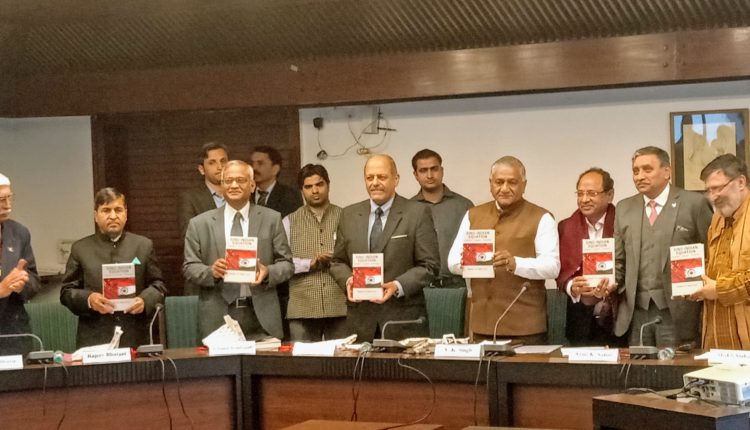The 2018 was a landmark year in bilateral relationships between India and China where Prime Minister Narendra Modi decided to hold the Wuhan summit without any agenda.
This was claimed by Minister of State for External Affairs Gen (Retd.) V.K. Singh in New Delhi on Feb 5.
The minister said that the Wuhan Summit broke the chill in the relationship after the 2017 Doklam stand off.
The former Army Chief V.K. Singh was at Nehru Memorial Museum & Library (NMML) in New Delhi to launch of a book Sino-Indian Equation: Competition + Cooperation – Confrontation authored by Brig (Dr.) Rajeev Bhutani (retd).
The minister said he had scanned through the book but couldn’t read much because of the time limitation.
However, the former Indian Army Chief was all praise for the book and said there was a great amount of research which had been done in it by the author.
The 270-page Sino-Indian Equation: Competition + Cooperation – Confrontation is the second book authored by Brig (Dr.) Rajeev Bhutani. His first book Rise of China: 2030 and its Strategic Implications was published in 2016.
In his address, Gen. Singh also rejected the idea of a Chinese encirclement of India under the so-called ‘String of pearls strategy’.
Brig Bhutani’s book Sino-Indian Equation: Competition + Cooperation – Confrontation too very amply talks about the success of Wuhan Summit held in April 2018 in China which paved the path of cooperation between the two countries.
“Since then both the leaders Narendra Modi and Xi Jinping had met four times last year which is considered a milestone in bilateral relations. Consensus is being built up between the two leaders to replace confrontation and competition between the two countries with cooperation. Framework of my book is based on this concept,” Brig Bhutani said.
This book also touched upon the crucial issue of ‘String of pearls strategy’ the China is said to be implementing in the region and which is apparently the cause of concern for India.
However, the External Affairs minister Gen (Retd.) Singh refuted the idea of Chinese encirclement of India under the ‘String of pearls strategy’,
“If we are friendly with Kazakhstan, Russia, Japan, Laos, Vietnam, Myanmar and Tajikistan, does China call it ‘string of pearls’? I don’t think so. Each country creates its own relationships, for its own benefits. Some of them result in good influences, some of them may not result in good influences,” he added.
While commenting on the border disputes with China, the minister said, “Land boundary is one issue and relationship is another. The land boundary is a very complex issue for many reasons, partly because of our fault the way thing panned out, partly because of history attached to it, also because of lack of vision to see where the things would go, also because of result of a war as lot of things have fallen down from there. But when you look at the relationship – both historical and what is now today, its slightly different and with different flavor.”
NMML director Dr. Shakti Sinha was also present on the occasion and moderated the session.
On the occasion were also Prof. Srikanth Kondapalli, the chairman of Centre for East Asian Studies, JNU and Lt. Gen. Arun Kumar Sahni.
(For feedback, please write to editor@asiancommunitynews.com)


